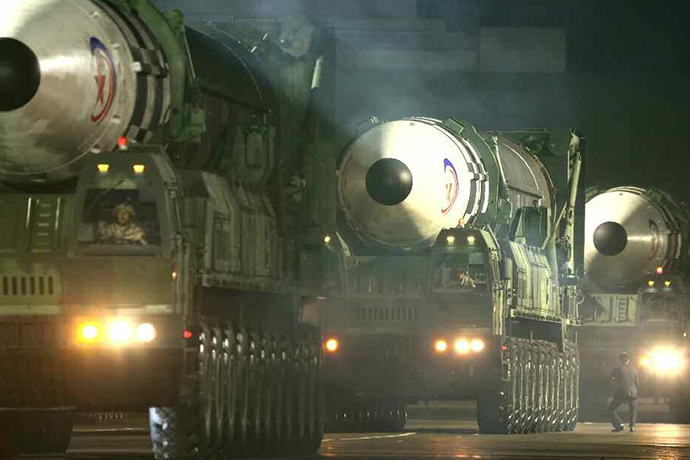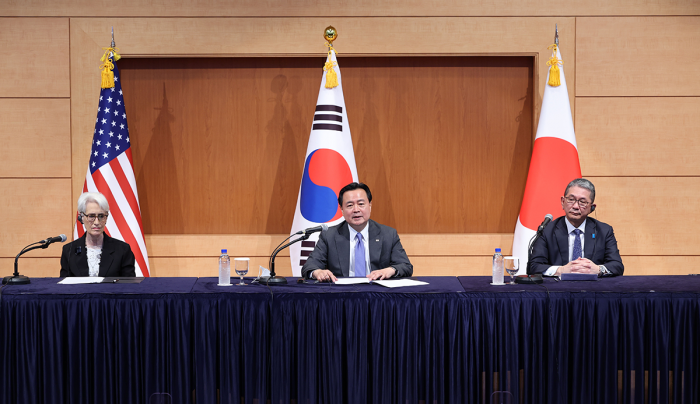North Korea missile tests drawing tougher response from US, South Korea
Allies have carried out joint military drills and reciprocated recent missile test by Kim Jong-un’s regime with a weapons test of their own
By The Wall Street Journal Jun 13, 2022 (Gmt+09:00)
LG Chem to sell water filter business to Glenwood PE for $692 million


Kyobo Life poised to buy Japan’s SBI Group-owned savings bank


KT&G eyes overseas M&A after rejecting activist fund's offer


StockX in merger talks with Naver’s online reseller Kream


Mirae Asset to be named Korea Post’s core real estate fund operator



Since taking office last month, South Korean President Yoon Suk-yeol, a conservative, has signaled a stronger military posture against Pyongyang. That tougher line is a departure from his predecessor, Moon Jae-in, who promoted dialogue and peaceful reconciliation with the North.
Mr. Yoon agreed with President Biden at a May summit in Seoul to expand joint military drills and strengthen deterrence against North Korea. Meanwhile, Pyongyang has conducted more than a dozen weapons tests this year, including long-range technology capable of reaching the U.S. mainland.
The latest test came Sunday, when North Korea fired eight short-range ballistic missiles—the most it has fired in a day.
South Korea and the U.S. quickly responded by firing eight surface-to-surface missiles the following day to show their “ability and readiness to immediately strike with precision,” South Korea’s Joint Chiefs of Staff said. On Tuesday, Washington and Seoul staged a show of air power, with 20 warplanes flying in formation off South Korea’s western coast. The exercise came during a visit to Seoul by Deputy Secretary of State Wendy Sherman, who promised a swift and forceful response if North Korea were to conduct a nuclear test, just as American and South Korean officials have warned of late.

The posture differs from the administration of Mr. Moon, whose five-year term ended last month. Joint U.S.-South Korean military drills were once large-scale field exercises. But the training was scaled back and largely limited to computer simulations due to Pyongyang’s protests and former President Donald Trump’s orders to tone them down.
Shows of force to North Korea’s weapons activity were rare from Mr. Moon’s government. Mr. Moon largely refrained from calling Pyongyang’s missile tests provocations. In contrast, the Yoon administration has called all of the North’s recent tests provocative.
South Korea is now “signaling to Pyongyang that their missiles can be intercepted by Washington and Seoul,” said Go Myung-hyun, a senior fellow at the Asan Institute, a Seoul-based think tank.
Despite Mr. Moon’s calls for talks, North Korea continued to expand its missile program and has now completed preparations for its seventh nuclear test, officials in Seoul say. Mr. Yoon’s shift to a stronger deterrence policy is an attempt to dissuade North Korea from expanding its arsenal and reinstate pressure for denuclearization, according to Pyongyang watchers.
The U.S. and North Korea haven’t held formal denuclearization negotiations in more than 2½ years. The Biden administration has repeatedly offered to meet without preconditions, though the Kim Jong Un regime hasn’t engaged.
Last week, the U.S. and South Korea staged their first combined military exercises involving an American aircraft carrier in more than four years. The drills took place for three days in international waters off the Japanese island of Okinawa. Mr. Biden also promised to deploy strategic assets such as bomber aircraft and missile submarines to Seoul to deter North Korea.
The recent joint U.S. and South Korean exercises are extremely dangerous actions that target North Korea, Pyongyang’s state media has said.
South Korea is also participating in U.S.-led multinational maritime exercises that begin later this month, when it will dispatch its largest naval fleet to waters off Hawaii. North Korea criticized the decision, calling South Korea “loyal dogs” of the U.S.
Officials from Washington and Seoul say a firm response is necessary to deter North Korean attacks. But there is a risk that Mr. Yoon’s more assertive approach could further exacerbate inter-Korean tensions and give North Korea justification to accelerate its weapons testing, North Korea watchers say.
Mr. Yoon has pursued closer trilateral cooperation with the U.S. and Japan, a decision that has been welcomed by officials in Tokyo. Under Mr. Moon, South Korea threatened to pull out of a military information sharing agreement with Japan. But in response to the recent North Korean launches, the U.S., South Korea and Japan have issued warnings in unison and officials have met frequently to discuss the North Korean threat. Japan and the U.S. also carried out a joint air patrol in response to North Korea’s recent missile launches.
North Korea will see closer trilateral cooperation as a threat, especially as the U.S. and its allies coordinate more closely on information sharing related to North Korea’s missile tests and resume regular military exercises, said Cho Dong-youn, a military studies professor at Seo Kyeong University in Seoul.
“Having witnessed America’s limited intervention in Russia’s invasion of Ukraine, North Korea may cling to its nuclear arsenal as a last resort to protect its sovereignty,” Ms. Cho said.
Write to Dasl Yoon at dasl.yoon@wsj.com
-
 North KoreaNorth Korea fires three missiles after Biden ends Asia trip
North KoreaNorth Korea fires three missiles after Biden ends Asia tripMay 26, 2022 (Gmt+09:00)
3 Min read -

-
 ROK-U.S. SCMUS and South Korea to update wartime plans for North Korea
ROK-U.S. SCMUS and South Korea to update wartime plans for North KoreaDec 03, 2021 (Gmt+09:00)
3 Min read -
 North KoreaNorth Korea can make more uranium for nuclear bombs than previously thought
North KoreaNorth Korea can make more uranium for nuclear bombs than previously thoughtNov 04, 2021 (Gmt+09:00)
5 Min read -
 North KoreaNorth Korea puts on show of missile might as Kim Jong-un snubs US
North KoreaNorth Korea puts on show of missile might as Kim Jong-un snubs USOct 13, 2021 (Gmt+09:00)
2 Min read


